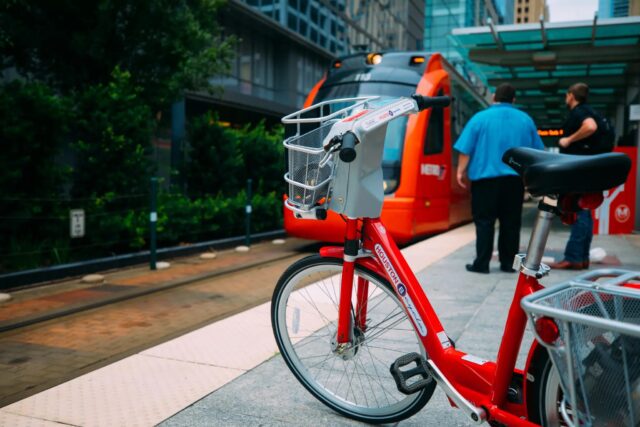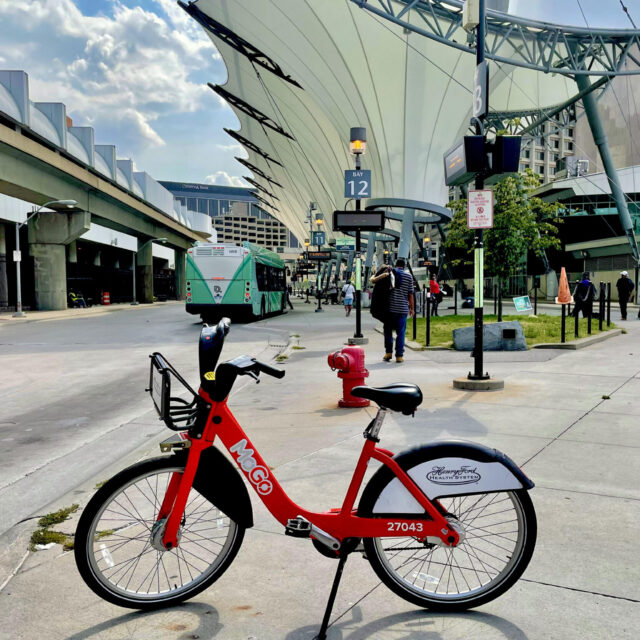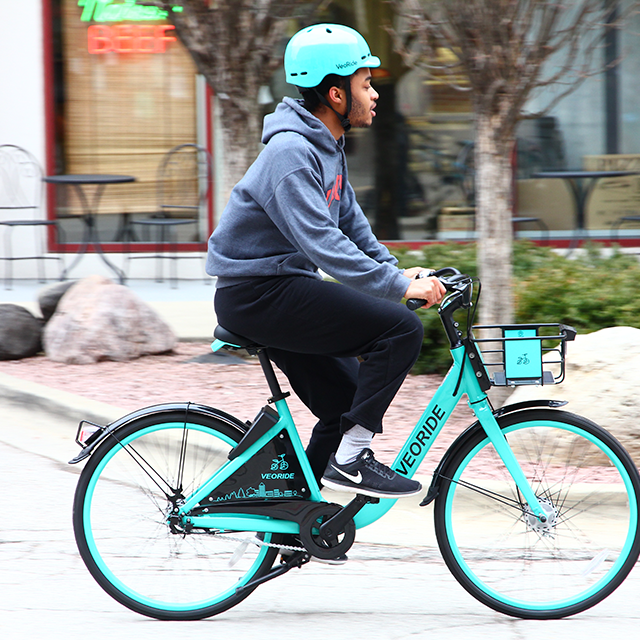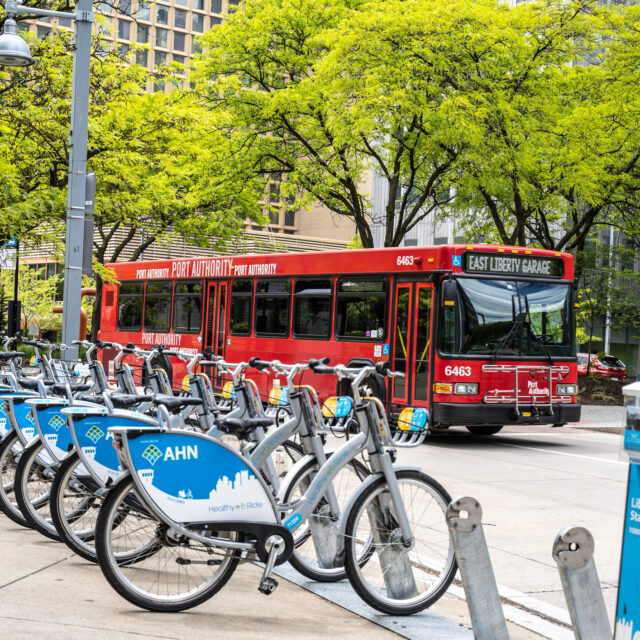Houston’s Transit Agency Will Subsume Bike Share
by Kiran Herbert, Communications Manager
February 1, 2023
The Metropolitan Transit Authority of Harris County will take over the operation of Houston BCycle, Houston’s only bike-sharing program.

A Houston BCycle bike sits near a downtown Houston METROrail station. (Photo credit: Metropolitan Transit Authority of Harris County)
In the past few months, Houston BCycle, the city’s bike share system, has fallen on hard times. Houston BCycle is run by Houston Bike Share, the nonprofit created in 2012 to oversee the system of kiosk-based bikes, which launched with only three stations and fewer than 20 bikes. In the past decade, the system has grown substantially to 153 stations spread across neighborhoods and roughly 1,000 bikes, some electric-assist.
As the system grew, so did ridership. This posed a financial challenge for Houston Bike Share, which strained to keep up with operating costs (it was estimated that Houston BCycle cost $80,000 a month, which exceeded the amount coming in from customer payments). In November, Houston Bike Share made the decision to reduce its system to 75 kiosks as a “temporary cost-casing measure,” focusing efforts on the downtown area. By all accounts, the reduction in services was disheartening to riders, many of whom had grown to rely on bike share.
Then, after the temporary closures were made permanent in January, the Metropolitan Transit Authority of Harris County (Metro) announced that it was considering taking over bike share and integrating it with transit, a move welcomed by Houston Bike Share. On January 26, the Metro board voted to subsume bike share, a move many hope will better establish bike share as a viable first/last-mile option and a reliable form of transportation in the large, car-dependent city. The change would mark a major shift in bike share use: About 90% of Houston BCycle users said they use the system for recreation rather than transportation.
“Metro’s plan would be to change that to make transit interconnectivity more the focus and more the driver of how this bike-sharing network is being used,” Metro Chief Financial Officer George Fotinos said during a January 18 public safety committee meeting.
The plan is for Metro to work with Houston Bike Share over the next six to nine months, developing a transition plan that would rethink the system’s footprint and adapt it to better align with bust and light rail. The hope is that bike share’s integration with transit will not grow ridership but simultaneously help alleviate transportation insecurity and reduce Houston’s greenhouse gas emissions. At the meeting, the board specifically mentioned expanding the system’s usage to include youth commuting to school and adding tricycles for seniors or others unable to ride a traditional bike.
“I think it’s time to take a fresh look at how the [bike share] service is provided,” Metro CEO Thomas Lambert said at the January 18 meeting. “I want to emphasize equity. I want to emphasize connectivity. I want to emphasize access.”
Equity, connectivity, and access are the main drivers behind integrating bike share with transit, a trend we’re seeing more and more in municipalities across the U.S. In other cities in Texas, bike share is already integrated with transit to varying degrees. In San Antonio, residents can purchase BCycle and VIA Metropolitan Transit passes using Transit app, making multimodal trips easier than ever. In Austin, the bike share system was rebranded as MetroBike and is firmly situated within the city’s Capital Metropolitan Transportation Authority (CapMetro), where its seen as a key component in improving transit connections and aiding Austin’s long-term mobility goals (In Los Angeles, the public transit authority also oversees bike share).
In Detroit, BBSP Living Lab grantee MoGo, also a nonprofit operator, is focused on creating a better alignment between transit and bike share. Key findings from a survey it conducted last year emphasized people’s desire for better co-location of bike share docking points and bus stations, better wayfinding signage to get between modes, and fair integration between transit and bike share. A different study found that bike share complements more than replaces public transit, helping to solve the first-/last-mile problem.
Metro will spend up to $500,000 over the transition period before bringing a long-term action plan back before the board. For now, the majority of transportation operators and advocates in Houston appear in support of bike share permanently merging with Metro.
“I think it is a critical missing piece to our existing portfolio,” Roberto Trevino, second vice-chair of the Metro board told Houston Public Media. “For any transit project, we always say, it starts off with a walk or ride to transit, and by incorporating this into our portfolio — we’re taking a look into the entire transit experience.”
The Better Bike Share Partnership is funded by The JPB Foundation as a collaboration between the City of Philadelphia, the National Association of City Transportation Officials (NACTO), and the PeopleForBikes Foundation to build equitable and replicable bike share systems. Follow us on LinkedIn, Facebook, Twitter, and Instagram or sign up for our weekly newsletter. Got a question or a story idea? Email kiran@peopleforbikes.org.



